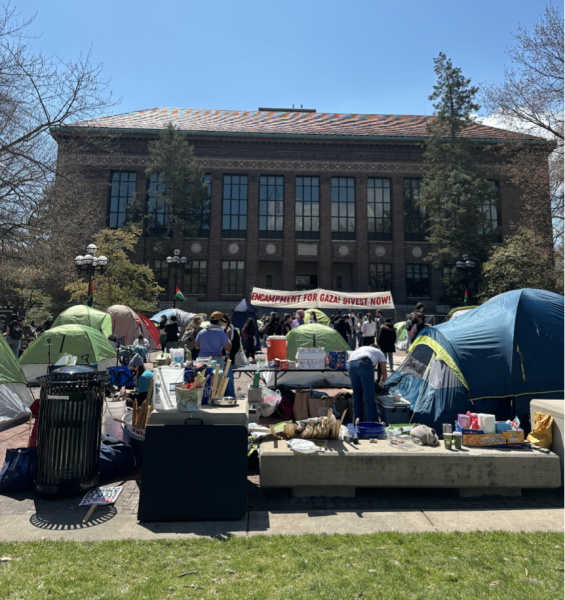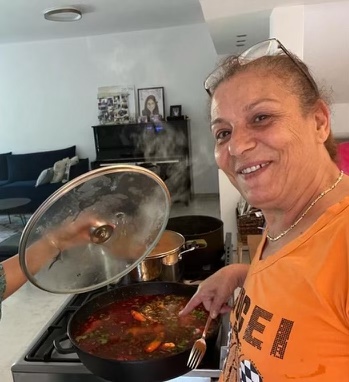Jewish teens reach out to help Chile cope

UPSCALE: The city of Talca, 65 miles from the earthquake’s epicenter, suffered damage to even its well-built structures.
An 8.8-magnitude earthquake in Chile on Feb. 27 left the world stunned, especially after Haiti. But the Jewish community there, having experienced little damage itself, immediately started organizing aid, sending tons of supplies and dozens of young Jewish Chileans to the coast to help the destroyed communities.
“The young adults are very motivated to work,” said Mr. Marcelo Isaacson, the executive director of the Jewish Community of Chile – the country’s umbrella Jewish organization, in a telephone interview with The Boiling Point. “We saw practically only young adults working at the most affected of the Jewish institutions.”
“A trip from Santiago to the worst-hit places takes 10 or 12 hours by car. They traveled the whole night. It’s truly a work that’s very, very special.”
The earthquake, whose epicenter lay 200 miles south of Santiago, the capital of Chile, lasted about 90 seconds and was declared the fifth strongest in the last 100 years. The death toll finally settled close to 300 with extreme structural damage in the areas near the epicenter. Many people lost all their possessions and small communities near the coast were wiped out by a tsunami that followed.
Immediately following the Saturday earthquake, leaders of the Chilean Jewish community met to assess the damage.
“The Jewish community of Chile declared a state of emergency and there was a meeting where leaders examined the situations that the different institutions in the Jewish community were in – like synagogues and schools,” said Mr. Ronan Yosif, the President of the Chile Zionist Youth Council, in a phone interview.
Since the Jewish institutions of Chile had managed fairly well, the community’s relief efforts concentrated on the coastal cities experiencing most of the impact.
From the Tuesday to the Saturday after the earthquake, 150 “madrijim,” or leaders, of the Chile Zionist Youth Council, between the ages of 16 and 21, worked together to organize blankets, tents, diapers, and medicines at the Haim Weizman-ORT Hebrew Institute of Santiago, a Jewish school with 1,700 students, and the Estadio Israeli Macabi, a Jewish social club.
“Volunteers were there working, packing, and making a day-by-day inventory until Saturday at midnight, when we prepared four trucks with supplies,” Mr. Yosif explained. “A team of madrijim adults ages 21 and up went to give off the provisions to the province of Cauquenes, the region most affected by the tsunami.”
The Jewish community sent 40 tons of supplies worth $800,000, as later announced on a Chilean national telethon.
Teenagers also invented an innovative technique for collecting food.
“If you were in the supermarket, before paying, the teenagers offered you a can of tuna fish or milk for you to buy and they would send it [to the affected communities],” wrote Rabbi Levi Perman, the head of Adult Education at Jabad-Lubavitch in Santiago, in an e-mail to the Boiling Point.
Many other teenagers are participating in an organization called A Roof for Chile, which “is building temporary wooden houses for families — immediate solutions for the people whose homes have been destroyed but want to keep staying in them,” Mr. Yosif said.
“Going to a very affected place and seeing the reality and the most affected regions was very impacting for the teenagers – [these are] things that one retains forever,” he added.
The majority of Chile’s Jewish community of 16,000 resides in Santiago, with families also located in the southern cities of Concepcion and Valparaiso. No Chilean Jews were killed, and, except for a destroyed Masorti synagogue in Concepcion, Jewish institutions and synagogues suffered only moderate damage.
“There were small material damages in the Jewish community’s institutions, like the Community Israelita of Santiago that had just built a new community center; its windows broke,” Mr. Isaacson said. But more important was the fall of the walls that enclosed the cemetery.”
Walls also fell in Temuco, where the oldest synagogue in all of Chile suffered structural damage, he said.
“It was built in the 1900s,” Mr. Isaacson said. “That is where the organized Jewish community of Chile was born.”
Rabbi Alejandro Bloch of the B’nei Israel synagogue of Santiago told the Boiling Point by email that Chileans are channeling their shock at the huge quake into action.
“People have passed through different stages; of fear, of anguish, of anger, and then of a will to help,” said Rabbi Bloch.
Organizations outside of Chile are helping as well. The AMIA institute in Argentina, the American Jewish Committee and the American Jewish Joint Distribution Committee are fundraising for the relief effort. The Jewish Federation of Greater Los Angeles is accepting donations online athttp://www.jewishla.org/Donate.cfm.

Currently a staff writer at the Los Angeles Times, Leila has already had a distinguished career in journalism, writing ground-breaking reports for the Miami Herald, Moment Magazine and the Jewish Journal, particularly on the Jewish community in Argentina and its history through that country's "dirty war" and beyond. She also has interned for KCRW News in Santa Monica.
A graduate of Columbia University's Graduate School of Journalism in New York, she is Argentinian by birth and fluent in Spanish. She enjoyed her first dulce de leche ice cream at five months, became a Harry Potter fanatic at age eight, and got her second ear piercing at 14. Leila joined The Boiling Point team as a freshman, and her story assignments led her to her first-ever rock concert at the Troubadour (Say Anything!), watch intense behind-the-scenes Drama rehearsals, and wake up early before school to interview Jewish community leaders in Chile after the earthquake there. She was also the Shalhevet choir’s...





